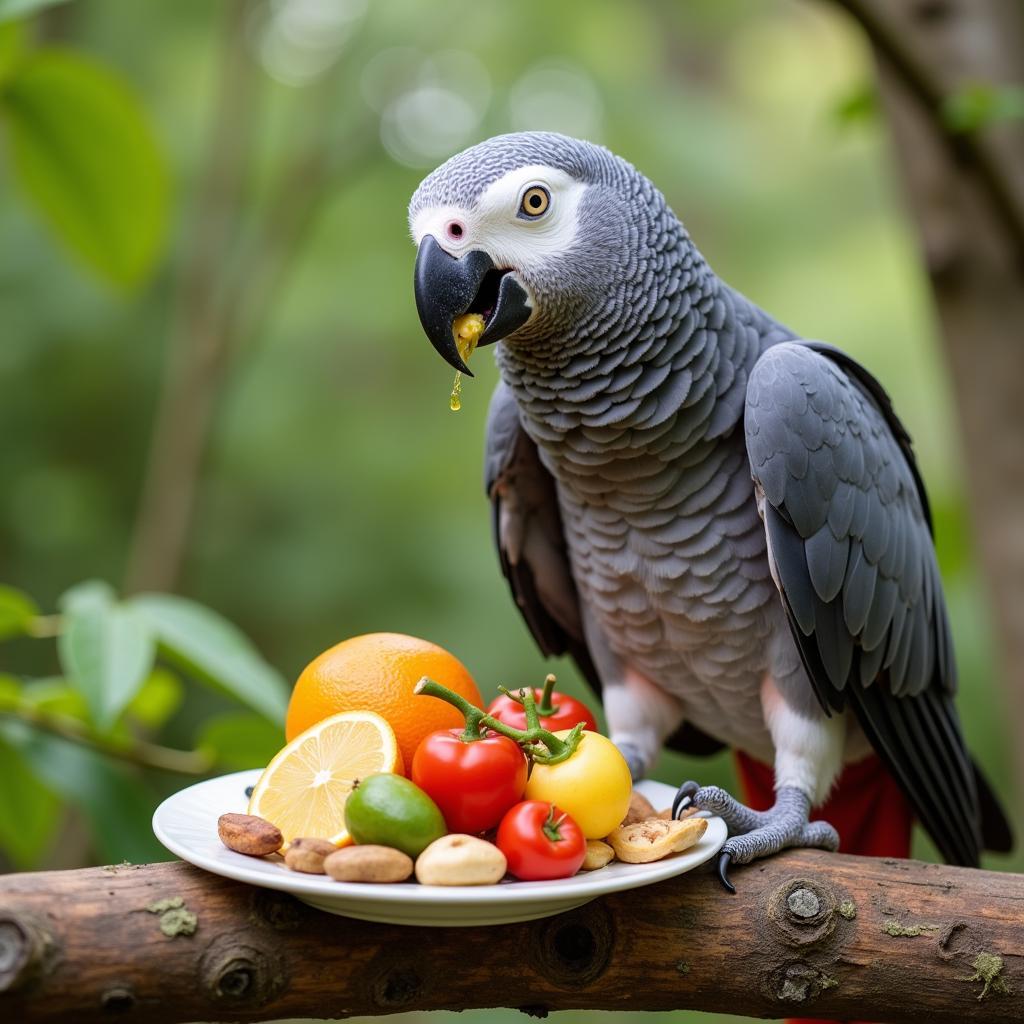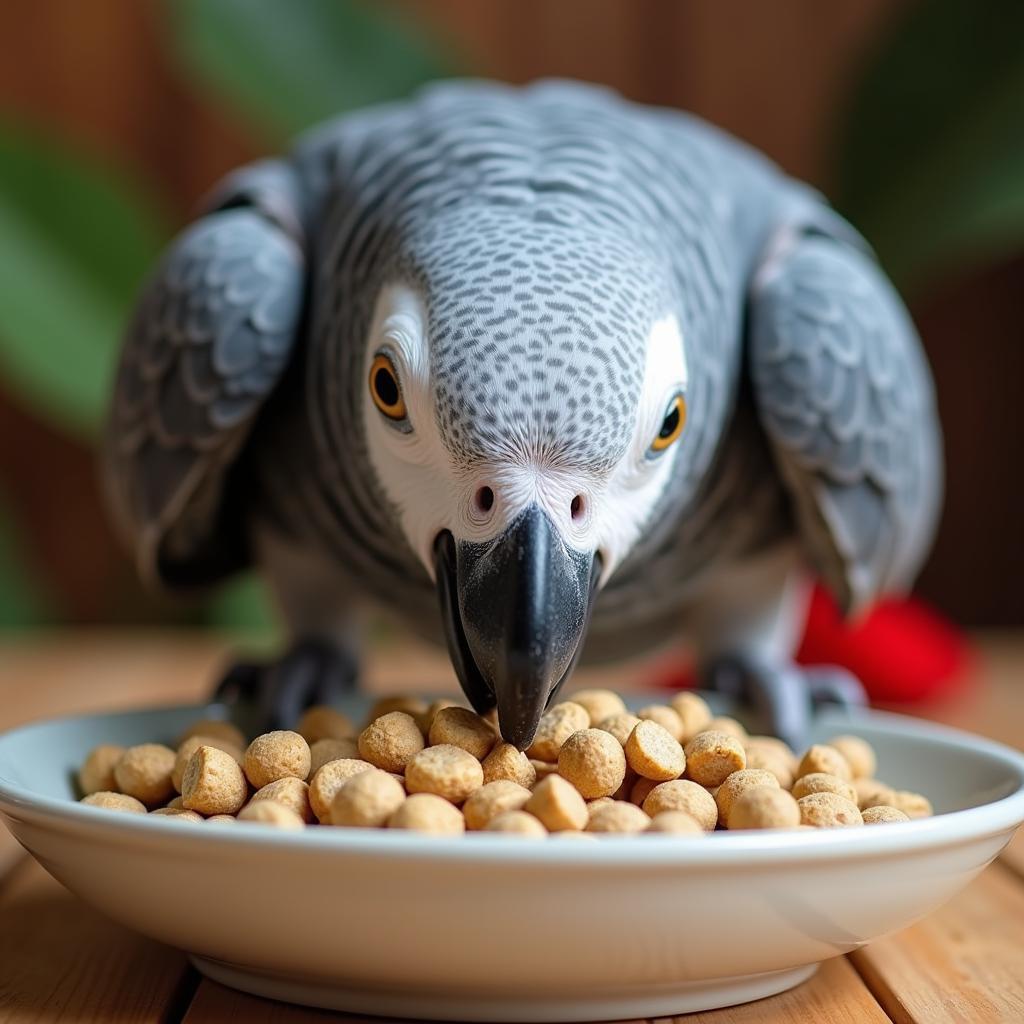The Ultimate Guide to an African Gray Diet
A healthy African Gray Diet is crucial for these intelligent and long-lived parrots. Providing the right nutrition ensures their physical and mental well-being. This guide delves deep into what constitutes a proper African gray diet, covering everything from essential nutrients to toxic foods and common dietary mistakes.
Understanding the Nutritional Needs of an African Gray
African grays, like all parrots, have specific dietary requirements that differ from other birds. Their diet should mimic what they would consume in the wild, which consists primarily of fruits, vegetables, seeds, and nuts. However, simply offering a bowl of seeds isn’t sufficient for an optimal African gray diet. A well-balanced diet should provide a diverse range of nutrients to support their overall health. This includes proteins, carbohydrates, fats, vitamins, and minerals.
A crucial aspect of an African gray diet is calcium. Calcium deficiency can lead to serious health problems, including seizures. Cuttlebones are a good source of calcium and should always be available. Dark, leafy greens like kale and spinach also contribute to calcium intake.
Beyond calcium, vitamins are vital. Vitamin A deficiency, for example, can weaken the immune system, making the bird susceptible to infections. Offering a variety of colorful vegetables can help ensure they receive adequate vitamins.
Protein is another important component of an African gray diet. While seeds provide some protein, it’s essential to supplement with other sources like legumes and cooked chicken.
After this introductory overview, let’s delve into the specifics of what makes a balanced African gray diet. For toys and other accessories, consider checking out African gray toys amazon.
 African Gray Parrot Enjoying a Healthy Meal
African Gray Parrot Enjoying a Healthy Meal
What to Feed Your African Gray: A Detailed Breakdown
Creating a well-rounded African gray parrot diet involves incorporating a variety of food groups. Fruits should make up about 20-25% of their diet and should include a mix of berries, apples, bananas, and melons. Avoid avocados, as they are toxic to parrots. Vegetables should constitute around 70-75%, with options like carrots, broccoli, sweet potatoes, and leafy greens being excellent choices.
Seeds and nuts should be offered in moderation, making up about 5-10% of the diet. While they enjoy seeds, an excess can lead to obesity and nutritional deficiencies. Healthy options include sunflower seeds, almonds, and walnuts. Pellets specifically formulated for African grays can also be a part of their diet, providing a balanced mix of nutrients.
If you are considering buying an African Gray, check out resources like African gray parrot for sale olx or learn more about their diet at African gray parrot diet.
 African Gray Parrot Eating Pellets
African Gray Parrot Eating Pellets
Foods to Avoid: Keeping Your African Gray Safe
Certain foods are toxic to African grays and should be strictly avoided. Chocolate, caffeine, alcohol, and avocado are all harmful. Additionally, avoid feeding them anything high in salt, sugar, or fat. These can lead to various health issues, including obesity, heart problems, and liver damage.
“A healthy diet is paramount for an African gray’s longevity and well-being,” says Dr. Avian Care, renowned avian veterinarian. “Avoiding toxic foods is as crucial as providing nutritious ones.”
Common Mistakes to Avoid in an African Gray Diet
One common mistake is overfeeding seeds. While seeds are a part of their natural diet, they shouldn’t be the primary food source. Another mistake is not offering enough variety. A diverse diet ensures they receive all the essential nutrients. Lastly, neglecting fresh water is a serious oversight. Fresh, clean water should always be available.
If you’re interested in raising these beautiful birds from a young age, you might want to learn about African gray parrot eggs and babys.
 Variety of Healthy Foods for an African Gray
Variety of Healthy Foods for an African Gray
Conclusion
A proper African gray diet is fundamental to their health and happiness. By understanding their nutritional needs and providing a balanced and varied diet, you can ensure your feathered companion lives a long, healthy, and fulfilling life. Remember, a healthy diet is an investment in their well-being. So, prioritize an appropriate African gray diet for a thriving, happy parrot.
FAQs
- What is the best diet for an African gray parrot? A varied diet of fruits, vegetables, pellets, and a small amount of nuts and seeds.
- Can African grays eat avocado? No, avocados are toxic to African grays.
- How much should I feed my African gray? Portion sizes depend on the bird’s age and activity level, but generally, they should consume about 1/4 cup of food daily.
- What are the signs of a healthy African gray? Bright eyes, smooth feathers, and active behavior.
- Can African grays eat human food? Some human foods are safe in moderation, but always consult a vet before offering anything new.
- How can I encourage my African gray to eat healthy foods? Introduce new foods gradually and offer them alongside their favorite treats.
- What is the importance of calcium in an African gray’s diet? Calcium is crucial for bone health and prevents seizures.
You might also be interested in African gray parrot jaipur for information on acquiring these birds in India.
Common Scenarios and Questions
Scenario: Your African gray is only eating seeds.
Question: How can I transition my bird to a healthier diet?
Scenario: Your African gray is losing feathers.
Question: Could this be related to their diet?
Scenario: You are unsure about the appropriate portion sizes for your African gray.
Question: How much food should I be offering?
Further Exploration
For more information on caring for your African Gray, explore these related articles on our website: African Gray Parrot Diet
Need help finding the perfect toys for your feathered friend? Check out African gray toys amazon.
For any assistance, please contact us at Phone: +255768904061, Email: kaka.mag@gmail.com, or visit our address: Mbarali DC Mawindi, Kangaga, Tanzania. We have a 24/7 customer support team.



